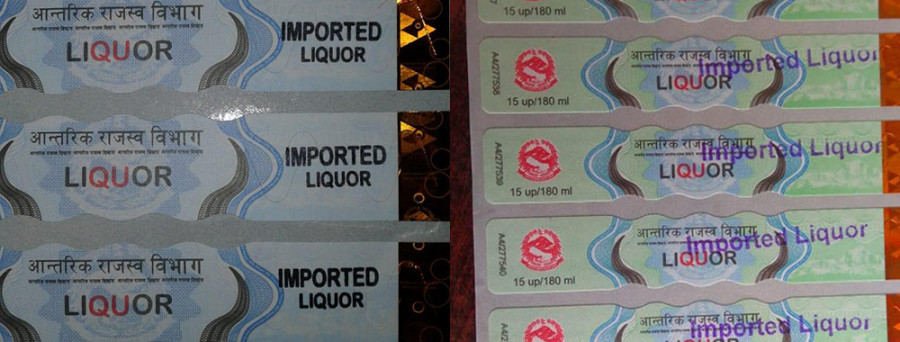Money
Shortage of excise stickers likely to deepen after Indonesian company fails to sign contract
Authorities look for alternatives as they can’t issue fresh bids or award the contract to the second-ranked bidder.
Prithvi Man Shrestha
Officials at the Inland Revenue Department, which has been reeling under a shortage of excise stickers that go on alcohol and tobacco products sold in Nepal, heaved a sigh of relief in February after the Supreme Court verdict allowed them to resuscitate plans to buy such stickers.
But the relief was short-lived as Perusahaan Umum Percetakan Uang Republik Indonesia (Perum Peruri), the Indonesian company selected to supply the stickers in March, didn’t show up to sign a contract with the department.
“The Indonesian company has failed to show up to sign the contract,” said Thaneshwor Gautam, deputy director general at the department. “So, we have confiscated the company’s performance bonds and are initiating legal action against the company.” Officials hinted that the provision in the Public Procurement Act, which allows government agencies to recommend blacklisting a company that refuses to sign the contract after winning the bid.
Perum Peruri’s failure to sign the contract has complicated the case further as the government can neither award the contact to the second-ranked bidder, nor can it start the bidding process afresh.
A Lithuanian company, another bidder for the contract, has filed a case against the tax authority at the Supreme Court citing section 27(6) of the Public Procurement Act, which says contracts should be awarded to the second-ranked bidder if the first-ranked bidder refuses to sign the contract.
But, a senior official at the tax authority said that there were issues with the Lithuanian bid that don’t allow it to be awarded the contract. “We are in the process of responding to the court,” the official said. “Until the court clears this legal challenge, we cannot issue fresh bids for the exercise stickers,” said Shivadevi Dahal, another deputy director general at the department.
The tax authority failed to complete the bidding process after the Supreme Court in November last year, issued a stay order against the procurement plan and the order was lifted on February 24. Various Nepali printing companies had moved court against the plan.
Meanwhile, the department’s stock of stickers has been depleted. As per the law, excise stickers need to be pasted on liquor and tobacco products before they are sold in the market.
“We have already run out of stickers for imported liquors and some types of cigarettes,” Dahal said. “We will soon run out of stickers for other cigarettes and tobacco products.”
She said the department has been allowing producers of liquor and cigarettes to use stickers meant for other categories. “For example, we have allowed the use of the stickers meant for filter-based cigarettes for non-filter-based cigarettes,” she said.
She, however, said that this can’t go on for a long time. “Even if the current legal challenges are cleared and a fresh bid is issued immediately, it will take around 10 months to get the delivery of stickers,” she said.
Given this context, the department has formed a study team led by Dahal to study available alternatives to procure stickers.
“We are studying the possibility of printing the stickers at the printing press of the Department of Printing and Janak Education Materials Centre,” said Dahal. “We are also studying whether private printing presses can supply us the stickers as some private sector printers have printed recharge cards of Nepal Telecom and Ncell.”




 9.89°C Kathmandu
9.89°C Kathmandu















